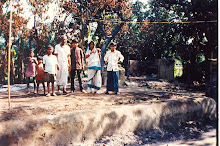RETURNING HOME
Sachi Ghosh Dastidar
Sachi Ghosh Dastidar
In our mobile society “home” is one’s residence, and for immigrants it is also the home of origin. In the Indian Subcontinent that home is the ancestral village or desh. We have called New York home for almost all of Shuvo’s life, though he was born in Alabama. Then there is Calcutta where Sachi grew up and Lakhsman-kathi village in coastal Bangladesh which has been our home since mid-1500s, until the family was evicted following anti-Hindu pogroms after the Bengal/India partition. However to the locals even Lakhsman-kathi is not truly our home because our family had lived there for “only” four hundred years, but it is the village of Gava in the same delta region. In Gava, it is said that the “Ghosh Dastidar” family lived from the time immemorial, although written history covers only up to 10th century. Gradually most of the Ghosh Dastidars and other Hindus fled to India.
On our vacation we were “at home” in Calcutta to be with our extended family, most of whom Shuvo was meeting for the first time as a teenager. At the urging of Sachi’s sister Mejdi in India, we decided to visit our Bangladeshi home, where she lived as a child. Mejdi felt that our blue passports might make things easier.
From Calcutta we flew to Dhaka to catch an overnight ship to Barisal City, 140 miles south. From Barisal, we traveled 17 miles north in two hours crossing three ferries to reach Lakhsman-kathi. It was a typical Hindu village, which now has both Hindus and Muslims. At the bus stop we were home again! Everyone seemed to know our home: Bishnu-Bari, the house with the 14th century Preserver God's temple. As Mejdi bought offerings for the temple, a group our “neighbors,” Muslims and Hindus, came forward to take us to “our home.” Our walk along the dirt road was covered with beautiful greenery and ponds. Coastal Bengal is one the most picturesque places on earth, especially after monsoon rain when countryside turns green and colorful. Our new friends told us major events in our family history covering many generations. A Muslim family who knew our family intimately now lives in our home and met us with what was to Shuvo, unfamiliar friendliness, at the gate across the garden. Our ancestral home is a two story wooden house with tin roof. We were interested to see the rooms where many in our family were born; the mediation [puja] room; the vegetarian kitchen; the entrance tulshi plant prayer pedestal. Mejdi was interested to look at the women’s pond where our older sister, Didi, almost drowned, when she was three years old. The pond is still there, but not the tulshi pedestal. A poor Hindu family looks after our Bishnu Temple, but the 17th century Kali Temple, the black Goddess of Strength, is gone. Marks on the wall painted by women during births, weddings, and deaths are gone, but trees brought by new brides from their home were there. Middle son of the family, a secular nationalist, requested us to stay at “our home.”
At Barisal City our host was able to locate the other home -- Gava, and introduced us to a Gava resident to take us to "our home." What was a day-long journey by boat has now been cut down to a 60 minute taxi ride, and mile walk through the country road. In the dry season light vehicles can use this road, but during monsoons one has to walk bare feet through ankle-deep mud, a rather pleasurable experience, trying to avoid rocks, or a journey by boat taking several hours. By the time we reached Gava, word had spread that “their cousins are back.” Before partition, it was a highly educated, prosperous Hindu village, but most of that is gone. Many of her residents held important jobs throughout India. The villagers gave us a tour telling us exact dates and incidents when each of the families fled; the years when post office, and other institutions closed. They took us around the two old land marks: a bridge over the river, and the other a shining five-steeple Pancha-Ratna Temple, whose deities are gone now, and a Muslim mosque has been built on its small property. Next to the 100 year old high school we were at our first “home,” i.e., at one of four Ghosh Dastidar families who live there. Fruits and coconut drink were ready. Shuvo was “just” 19 generations removed, so he was still a close relative. Gava and Lakhsman-kathi residents kept reminding us, “remember, this is your home.” For our relations we carried flowers and soil from Gava and Lakhsman-kathi.
For pictures, see LakhsmanKathi, Barisal posting.
Source: News India-Times (a New York weekly), July 30; 62

No comments:
Post a Comment